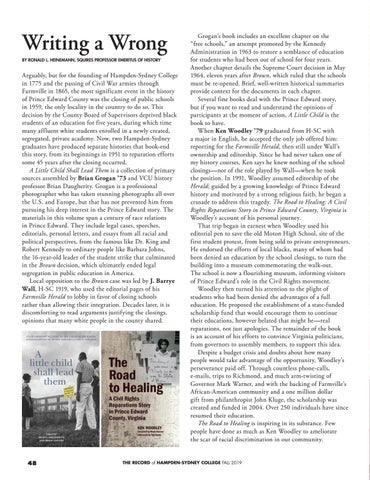Writing a Wrong BY RONALD L. HEINEMANN, SQUIRES PROFESSOR EMERITUS OF HISTORY
Arguably, but for the founding of Hampden-Sydney College in 1775 and the passing of Civil War armies through Farmville in 1865, the most significant event in the history of Prince Edward County was the closing of public schools in 1959, the only locality in the country to do so. This decision by the County Board of Supervisors deprived black students of an education for five years, during which time many affluent white students enrolled in a newly created, segregated, private academy. Now, two Hampden-Sydney graduates have produced separate histories that book-end this story, from its beginnings in 1951 to reparation efforts some 45 years after the closing occurred. A Little Child Shall Lead Them is a collection of primary sources assembled by Brian Grogan ’73 and VCU history professor Brian Daugherity. Grogan is a professional photographer who has taken stunning photographs all over the U.S. and Europe, but that has not prevented him from pursuing his deep interest in the Prince Edward story. The materials in this volume span a century of race relations in Prince Edward. They include legal cases, speeches, editorials, personal letters, and essays from all racial and political perspectives, from the famous like Dr. King and Robert Kennedy to ordinary people like Barbara Johns, the 16-year-old leader of the student strike that culminated in the Brown decision, which ultimately ended legal segregation in public education in America. Local opposition to the Brown case was led by J. Barrye Wall, H-SC 1919, who used the editorial pages of his Farmville Herald to lobby in favor of closing schools rather than allowing their integration. Decades later, it is discomforting to read arguments justifying the closings, opinions that many white people in the county shared.
48
Grogan’s book includes an excellent chapter on the “free schools,” an attempt promoted by the Kennedy Administration in 1963 to restore a semblance of education for students who had been out of school for four years. Another chapter details the Supreme Court decision in May 1964, eleven years after Brown, which ruled that the schools must be re-opened. Brief, well-written historical summaries provide context for the documents in each chapter. Several fine books deal with the Prince Edward story, but if you want to read and understand the opinions of participants at the moment of action, A Little Child is the book to have. When Ken Woodley ’79 graduated from H-SC with a major in English, he accepted the only job offered him: reporting for the Farmville Herald, then still under Wall’s ownership and editorship. Since he had never taken one of my history courses, Ken says he knew nothing of the school closings—nor of the role played by Wall—when he took the position. In 1991, Woodley assumed editorship of the Herald; guided by a growing knowledge of Prince Edward history and motivated by a strong religious faith, he began a crusade to address this tragedy. The Road to Healing: A Civil Rights Reparations Story in Prince Edward County, Virginia is Woodley’s account of his personal journey. That trip began in earnest when Woodley used his editorial pen to save the old Moton High School, site of the first student protest, from being sold to private entrepreneurs. He endorsed the efforts of local blacks, many of whom had been denied an education by the school closings, to turn the building into a museum commemorating the walk-out. The school is now a flourishing museum, informing visitors of Prince Edward’s role in the Civil Rights movement. Woodley then turned his attention to the plight of students who had been denied the advantages of a full education. He proposed the establishment of a state-funded scholarship fund that would encourage them to continue their educations, however belated that might be—real reparations, not just apologies. The remainder of the book is an account of his efforts to convince Virginia politicians, from governors to assembly members, to support this idea. Despite a budget crisis and doubts about how many people would take advantage of the opportunity, Woodley’s perseverance paid off. Through countless phone-calls, e-mails, trips to Richmond, and much arm-twisting of Governor Mark Warner, and with the backing of Farmville’s African-American community and a one million dollar gift from philanthropist John Kluge, the scholarship was created and funded in 2004. Over 250 individuals have since resumed their education. The Road to Healing is inspiring in its substance. Few people have done as much as Ken Woodley to ameliorate the scar of racial discrimination in our community.
THE RECORD of HAMPDEN-SYDNEY COLLEGE FALL 2019
